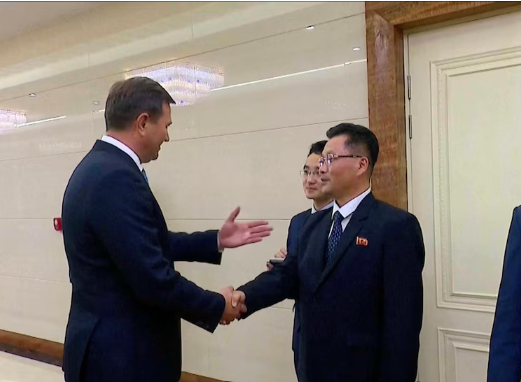Belarusian Foreign Minister Arrives in North Korea for Key Talks on Russia Cooperation

Belarus’ Foreign Minister, Sergei Aleinik, has arrived in North Korea for a series of high-level discussions, with a strong focus anticipated on enhancing cooperation with Russia. This visit underscores the strengthening ties between Belarus and North Korea, particularly in the context of their shared interests in regional and global affairs.
The primary agenda of Aleinik’s visit is expected to center around deepening Belarusian-North Korean collaboration, with a significant emphasis on reinforcing their partnership with Russia. The discussions are likely to cover various aspects of this trilateral relationship, including political, economic, and strategic cooperation.
Belarus and North Korea have maintained a steady relationship over the years, but the current geopolitical climate has further solidified their ties. The visit comes at a time when both nations are seeking to bolster their alliances in the face of international pressures and sanctions. Strengthening relations with North Korea is seen as a strategic move by Belarus to enhance its geopolitical leverage and secure additional support from its Russian ally.
The talks are expected to produce agreements or joint statements that highlight the commitment of both Belarus and North Korea to support each other’s interests. Additionally, there may be discussions on increased economic cooperation, including trade and investment, as well as collaborative efforts in various sectors such as defense and technology.
The visit also occurs against a backdrop of heightened scrutiny from the international community. Belarus, under President Alexander Lukashenko, has faced significant criticism and sanctions from Western nations due to its domestic policies and its support for Russia amid the ongoing conflict in Ukraine. North Korea, led by Kim Jong-un, remains isolated internationally, with stringent sanctions imposed by the United Nations and other countries due to its nuclear weapons program and human rights violations.
The outcomes of Aleinik’s visit could have broader implications for regional stability and international relations. Enhanced cooperation between Belarus and North Korea, particularly in the context of their alignment with Russia, may influence diplomatic dynamics in East Asia and beyond. Observers will be keen to see how these developments impact the geopolitical landscape and the response from major global powers.
As Belarus and North Korea continue to navigate their respective challenges, their growing partnership signals a potential shift in regional alliances and underscores the complexities of international diplomacy in the current era.
